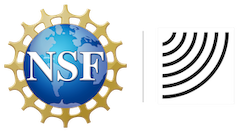2024 Winner
The U.S. National Science Foundation Laser Interferometer Gravitational-wave Observatory (NSF LIGO) Laboratory congratulates Louis Dartez of LIGO Livingston Observatory and Caltech for winning this year's LIGO Laboratory Award for Excellence in Detector Characterization and Calibration.

Louis Dartez is a Caltech postdoctoral scholar stationed at LIGO Livingston Observatory. He received his PhD in applied physics from the University of Texas at Arlington as part of a cooperative doctoral program with the University of Texas Rio Grande Valley. Louis develops detector calibration methods to deliver analysis-ready LIGO data and accurate uncertainty estimates as rapidly as possible. His interests include increasing the range and stability of current ground-based gravitational wave detectors. In his spare time, Louis enjoys camping, hiking, and cross-country road trips.
Dartez is recognized for his significant contributions to LIGO detector data calibration for the current observing run (O4), including new infrastructure for rapid data calibration. Thanks to his efforts, scientists worldwide have access to analysis-ready, low-latency calibrated LIGO data with accurate uncertainty estimates within minutes, a marked improvement over previous observation runs where producing such data required extensive re-calibration over the span of months.
To analyze gravitational wave data from a LIGO detector, small variations in light power at the output photodetector must be accurately converted into strain measurements of the two perpendicular 4 km "arms" of the interferometer. This requires a mathematical model representing the instrument's complex dynamics, derived from detailed characterization measurements. These assessments consider the optical configuration, mirror mechanics and actuators, photon-mirror interactions, electronics, and digital control systems. Any significant change in the instrument's behavior necessitates updates to the model, which involves new measurements, data analysis, model updates, and deployment. Previously, this process was highly time-consuming due to the lengthy duration of data collection and the manual effort needed for analysis and implementation.
Dartez, collaborating with the LIGO calibration team, introduced new measurement tools at LIGO Hanford Observatory to significantly reduce the time needed for data collection for calibration measurements. Furthermore, he spearheaded the effort to automate the calibration workflow for analysis and deployment at both Hanford and Livingston observatories. By developing a suite of tools that launched measurements, processed results, and generated standardized reports automatically, Dartez and his team reduced the time to update and deploy calibration models from weeks in previous observation runs to mere hours or days in O4. Dartez designed tools for ease of use by non-experts, allowing regular characterization measurements to be conducted by site operators without the direct involvement of calibration specialists. This capability enhanced the team’s ability to identify and correct calibration issues with a quick turnaround.
Dartez also played a critical role in troubleshooting and resolving calibration challenges, refining calibration infrastructure, updating and deploying calibration models, and estimating the calibration uncertainty budget during O4. His work also bridged the gap between hardware changes and the rapid production of calibration data, allowing seamless and reliable data distribution nearly immediately. Louis Dartez’s extensive contributions were vital for the timely and accurate delivery of calibrated data with accurate uncertainty estimates during O4.
For his work, Dartez will receive a $1,000 prize and present an invited seminar at one of the LIGO Laboratory sites (LIGO-Hanford, LIGO-Livingston, Caltech, or MIT) to share his achievements with LIGO Laboratory members. Dartez will also be presented with an award certificate at the next meeting of the LIGO-Virgo-KAGRA collaboration.
2024 Honorable Mentions
Sofía Álvarez-López (Massachusetts Institute of Technology) - for leading development of the GSpyNetTree algorithm, a Data Quality Report (DQR) tool to identify glitches in the presence of gravitational-wave signals for rapid event validation.
Tábata Aira Ferreira (Louisiana State University) - for investigations of the origin of common noise transients, or “glitches”, in Advanced LIGO detectors.
Jane Glanzer (Caltech) - for characterization of binary neutron star (BNS) range oscillations exhibited by the LIGO Livingston during the current observing run (O4).
Kaylah McGowan (Vanderbilt University) - for leading development of the ARCHGEM algorithm; a tool that helps determine the source of glitches due to scattered light.
Debasmita Nandi (Louisiana State University) - for investigations of the correlation between microseismic ground motion and scattered light noise in the LIGO Livingston detector.
Iara Naomi Nobre Ota (Louisiana State University) - for key contributions to the LIGO Summary Pages; a web-based interface for monitoring the performance of the LIGO detectors and their subsystems, used by hundreds of LIGO-Virgo-KAGRA researchers worldwide.
Zach Yarbrough (Louisiana State University) - for characterization of LIGO detector glitches through the lens of compact binary coalescence search pipelines GstLAL and PyCBC.




